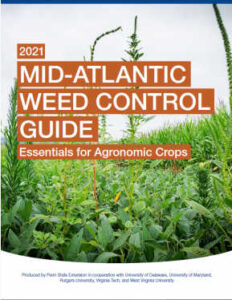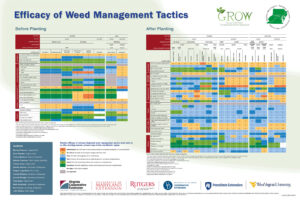EPA Releases Testing Data Showing PFAS Contamination from Fluorinated Containers
Value-Added Producer Grants in New Jersey
Grant.gov applications are due by April 29, 2021 and
paper applications must be postmarked by May 4, 2021
The Value-Added Producer Grant (VAPG) program administered by the USDA’s Rural Development Agency (RD), helps agricultural producers enter into value-added activities related to the processing and marketing of new products. The goals of this program are to generate new products, create and expand marketing opportunities, and increase producer income. [Read more…]
Covid Update From Secretary of Agriculture
March 5, 2021
COVID-19 Vaccine Update
Dear Farm Owner/Operator:
On March 1, 2021 Governor Murphy announced that farmworkers will be eligible for the COVID-19 vaccine starting March 15, 2021.
We understand that the ag community is anxious to have everyone on their farm vaccinated as soon as possible, especially since some of you already have workers in the field.
Here is how the vaccination program will roll out over the next week:
- The Department of Health (DOH) will send out a vaccine Q&A.
- A brief survey will be included in that email that will help them with supply and delivery planning. Survey questions will include:
- Business location
- Contact person for scheduling vaccinations
- Number of workers to be vaccinated
- Logistic considerations
Once you receive the survey, please fill it out and return it as directed to the DOH.
A Health official will follow up with your contact person to schedule vaccinations either on your farm or at a standing location.
Sincerely,
Douglas H. Fisher
Secretary
Webinar for Annual Dicamba Applicator Training
BASF will host several Live Virtual Webinars for annual dicamba applicator training. his training is required for Engenia herbicide and other dicamba products approved for over-the-top (OTT) applications on dicamba-tolerant soybean and cotton. Dicamba training is also offered through an online module.
These webinars are designed to learn about new application requirements and label enhancements for the 2021 season. Applicator training and certification can be obtained in multiple formats based on your schedule and needs. Due to COVID-19, dicamba applicator training will be primarily available through online offerings such as a self-paced training module and live virtual webinars.
Please visit http://www.engeniastewardship.com/ for training options.
Please also review PPA previous post on The 10 Best Management Practices to Avoid Herbicide Drift!
Live Virtual Webinars:
There are a total of 6 remaining events that are scheduled to occur every Tuesday @ 10 am eastern with the next one scheduled for March 9, 2021. Attendance is limited to the first 250 attendees per event so register early for the event that best fits your schedule. Live Virtual Webinars are scheduled for:
- March 9, 2021 @ 10 am eastern
- March 23, 2021 @ 10 am eastern
- March 23, 2021 @ 8pm eastern
- March 25, 2021 @ 10am eastern
- March 30, 2021 @ 10am eastern
Online Module:
This option will take approximately 1 hour to complete and contains a quiz at the end of the module. Once the module is completed a certificate is displayed that should be kept for your records. You will have the option to print and/or save your dicamba certificate. It is recommended that you complete this training on a web browser through a computer with a reliable internet connection.
As a reminder only certified applicators may apply Engenia herbicide or other OTT dicamba herbicides.
2021 Mid-Atlantic Field Crop Weed Management Guide

The 2021 updated version of the “Mid-Atlantic Field Crop Weed Management Guide” is available. This guide is produced by Penn State Extension in cooperation with weed scientists from University of Delaware, University of Maryland, Rutgers University, Virginia Tech, and West Virginia University.
The guide covers weed management for field corn, sorghum, soybean, small grains, and forage and pastures. Information concerning the use, restrictions, and recommendations of burndown, preemergence, and postemergence herbicides labeled on these crops can be found in the guide, including relative effectiveness data from locally conducted research. Description of the various premixes as well as guidance for managing troublesome weeds are also part of the guide.
The guide can be ordered on-line at https://extension.psu.edu/mid-atlantic-field-crop-weed-management-guide. Available to order are the paper copy for $10, the digital guide for $8, or both a hard copy and pdf for $18.
Comparing the Efficacy of Various Integrated Weed Management Tactics

Integrated weed management (IWM) combines various methods to reduce or eliminate the effect of weeds on crop production over time, using a combination of practices that are most effective for solving specific weed issues. These weed management techniques form a “toolbox” in which each “tool” can be integrated into a weed management plan catered to the particular farm and problem. The toolbox includes preventative, biological, chemical, cultural, and mechanical strategies. IWM also considers the weed species present and tailors strategies for these species.
A collaborative effort led by Dr. Michael Flessner with Virginia Tec has been developed to compare the efficacy of various integrated weed management tactics before and after planting at reducing the impact of common troublesome weed species. Other universities of the Mid-Atlantic Region (Rutgers, West Virginia University, Penn State, University of Delaware, and University of Maryland) have also participated to this project.
A poster providing relative effectiveness of various integrated weed management tactics for summer annual crops is now available (https://agweedsci.spes.vt.edu/extension/publications/iwm.html) and will help growers identify the most effective tactics to manage weeds.
